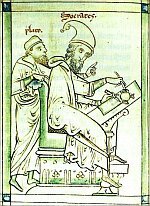|
SCIENCE FICTION AND FANTASY
|
|

|
|

Socrates and Plato
Plato was a
Classical Greek philosopher, mathematician, writer of
philosophical dialogues, and founder of the Academy in Athens, the first institution of higher
learning in the Western world. Along with his mentor, Socrates, and his
student, Aristotle, Plato helped to lay the foundations of natural
philosophy, science, and Western philosophy.
|
|
BOOK
ILLUMINATIONS
From Merrimon Book Reviews
HOME
ROMANCE
FICTION SUSPENSE & THRILLERS
MYSTERY HORROR
AUTHORS REVIEWER
PROFILES
|
Genesis
 by Bernard
Beckett
by Bernard
Beckett

Futuristic philosophical novel of consciousness
and the role of the State
Anaximander sits before the Academy
in a four hour examination on her research subject of Adam Forde
(2058-2077), an examination which will decide her fate.
Candidates for entrance into the prestigious Academy must face a panel
of examiners. With the internalized support of her mentor's
words, Anax presents her interpretation before the Academy
examiners. Both frightened and emboldened when her interpretation
veers from orthodoxy, Anax looks into the legend of Adam Forde with new
insights not only into the Republic's history, a history that has
become a mythical icon in the culture, but also into her own
values. Will her interpretation measure up?
With echoes of Socratic dialogue and Plato's REPUBLIC, Bernard Beckett's GENESIS looks into deeper
philosophical questions of consciousness in a futuristic world.
The role of the Republic and the individual in a post-plague world, a
world driven to take all necessary measures to defend itself, pits the
individual against the State, the automaton against a human
individual. What separates a highly developed robot from a human
being? What is consciousness? The examination takes Anax
into an ever deepening analysis of Adam Forde's actions. As she
answers the questions of the nameless examiners and brings two moments
of Adam Forde's life into the present to observe through a hologram
presentation, the reader him/herself catches a glimpse of the history
behind the culture that built the great Academy and from which Adam
Forde arose. In the beginning, Anaximander's exam has the feel of
all those oral defenses undertaken in today's universities, creating a
point of similar contact with Anax's hopes, dreams and
uneasiness. Never given individual names, the examiners
themselves are faceless. Just as Anax cannot read their thoughts,
neither can the reader. As she gets deeper and deeper into the
subject matter of her presentation, the narrative focuses on her
reactions to her subject until the surprising twist at the end.
GENESIS is a
philosophical novella set within a futuristic world. Suspenseful
at times, this novel is less a thriller as advertised but rather a look
at some of Plato's ideas (some turned on their side), reset in a new
futuristic world, a world that re-visions some of Plato's key concepts
into a context which shapes a new meaning and outcome. Although
classified as science-fiction, this novel will appeal more to readers
fascinated by the concept of consciousness in philosophy than those
readers looking for a more classical work of science fiction in terms
of the setting details. The science fiction elements are chiefly
developed in the background of the Republic's history and the life of
Adam Forde though the examination dialogue. That being said, GENESIS is a stunning work that
leaves this reader fascinated by the questions posed, all the more so
because of the multi-leveled setting the author provides. The
ending turns everything on its head. GENESIS is a powerful,
haunting book in a small package that leaves a reader asking essential
questions alongside Anax and even after the last page.
Publisher: Houghton Mifflin Harcourt (April 20, 2009)
Reviewed by Merrimon,
Merrimon Book Reviews
Review courtesy of Amazon Vine

|
|
|